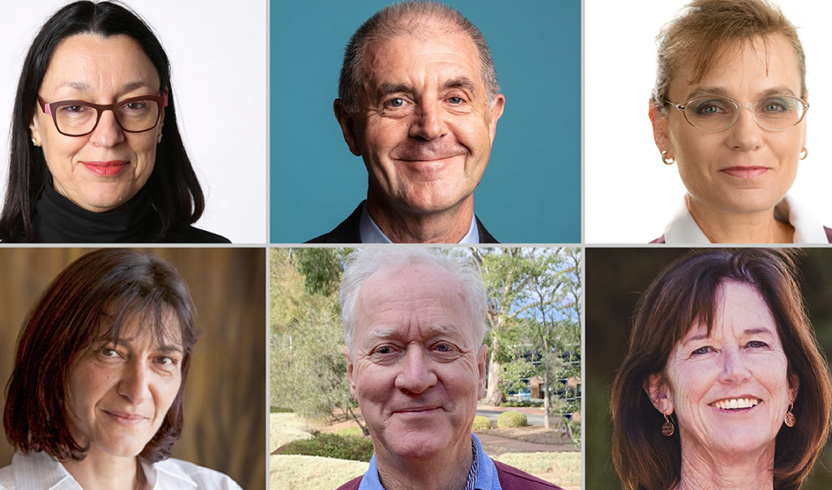
Six Fellows of the Australian Academy of Science have been recognised for their outstanding contributions to science by receiving an Order of Australia in the 2023 King's Birthday Honours List.
Professor Glenda Halliday AC FAA FAHMS was awarded a prestigious Companion of the Order of Australia (AC), for “eminent achievement and merit of the highest degree in service to Australia or to humanity at large”.
Professor Halliday—an Academy Fellow since 2021—is internationally acclaimed for her research on neurodegeneration, advancing our understanding of disease progression, and her promotion of neuroscience, mentorship and contributions to research evaluation.
She is Co-Chair and Scientific Lead of the Australian Parkinson's Mission and the Garvan Institute, and a Professor of Neuroscience at the University of Sydney. She has been the chief investigator on seven National Health and Medical Research Council grants since Scientific Program Committee of the National Institute for Dementia Research in 2018.
Her many accolades include the New South Wales Scientist of the Year award in 2022, the Robert A Pritzker Prize for Leadership in Parkinson's Research by the Michael J Fox Foundation in 2021, and the Nina Kondelos Prize by the Australian Neuroscience Society in 2011.
She received the AC “for eminent service to medical research in the field of neurodegenerative disorders, including the development of revised diagnostic criteria for Parkinson’s disease, and as a mentor”.
Professor David Craik AO FAA FRS was awarded an Officer of the Order (AO) for “distinguished service to science in the field of biological and medicinal chemistry, to tertiary education, and as a mentor”.
Elected to the Academy in 2013, Professor Craik is a biological chemist who has made important discoveries in structural biology, particularly in peptide toxins.
He discovered the cyclotide family of circular knotted proteins and, more generally, is a pioneer in the field of circular proteins.
In 2023, Professor Craik received the prestigious David Craig Medal and Lecture from the Australian Academy of Science for his research.
Additionally, four Academy Fellows were awarded the Member of the Order of Australia (AM), “for service in a particular locality or field of activity, or to a particular group”.
These Fellows include Professor Marcela Bilek AM FAA, Professor Maria Forsyth AM FAA FTSE, Emeritus Professor Peter Langridge AM FAA FTSE, and Emeritus Professor Robyn Owens AM FAA FTSE.
Professor Bilek has been recognised for “significant service to physics and biomedical engineering”.
Elected to the Academy in 2022, Professor Bilek is internationally known for contributions to the science and technology of plasma processes for surface engineering of materials.
Her work has enabled new capabilities in a range of settings, including magnetic storage devices; solid fuel plasma thrusters; implantable biomedical devices; in-vitro cell culture systems; diagnostics; stem cell and gene therapy; and nanomedicine.
In an interview with the Academy, Professor Bilek described discovery as a particularly exciting aspect of her career.
“The fact that we are doing work that we don’t necessarily know the answer to. It is never repetitive—well, except for the admin tasks, but we cope with that,” she said.
It is exciting to be working towards finding out the answers to how things work.
An Academy Fellow since 2015, Professor Forsyth has been recognised for “significant service to chemistry education, research and scholarship”.
Professor Forsyth is a world leader in developing advanced materials for a range of energy and infrastructure technologies.
Her group discovered a large new family of organic ionic ‘plastic’ materials that are being used in advanced energy storage technologies.
Professor Forsyth also developed significant understanding of charge transport at the interfaces between metals and electrolytes, and within other novel electrolyte materials. This has prompted the design of new materials for fuel cells, battery designs and technologies to prevent corrosion.
At the time of her election to the Academy, Professor Forsyth said she was looking forward to promoting women in science and science in schools through her Fellowship.
Academy Fellow Emeritus Professor Langridge is an eminent leader in the development and implementation of cereal breeding technologies, within Australia and internationally.
He initiated the application of molecular marker technology in large cereal and legume breeding programs in South Australia. These technologies were ultimately adopted by all major cereal breeding programs in Australia.
At the same time, he trained many postgraduate students in emerging breeding technologies.
Emeritus Professor Langridge also pioneered the introduction of plant functional genomics in Australia into crop improvement programs and was a member of a core group that initiated the international barley genome sequencing program.
He has received an AM for “significant service to science in the field of plant genomics and agriculture”.
Emeritus Professor Owens was recognised for “significant service to science in the fields of computer vision and mathematics”.
Elected to the Academy in 2020, Emeritus Professor Owens has an exceptional research track record in computational vision science, having developed fundamental theory in feature detection and object recognition, and applying these theories across many disciplines—from biomedical science through to facial recognition.
Her pioneering work has been acknowledged with the prestigious UK Rank Prize in 2010 in Nutrition and Optoelectronics.
Professor Owens has a sustained track record in research training and research policy development in the Australian higher education sector, including several national collaborative research infrastructure capabilities, and in promoting women in science and STEM education.
The Order of Australia recognises Australians who have demonstrated outstanding service or exceptional achievement.
Anyone can nominate any Australian for an award in the Order of Australia. If you know someone worthy, nominate them now.
© 2026 Australian Academy of Science